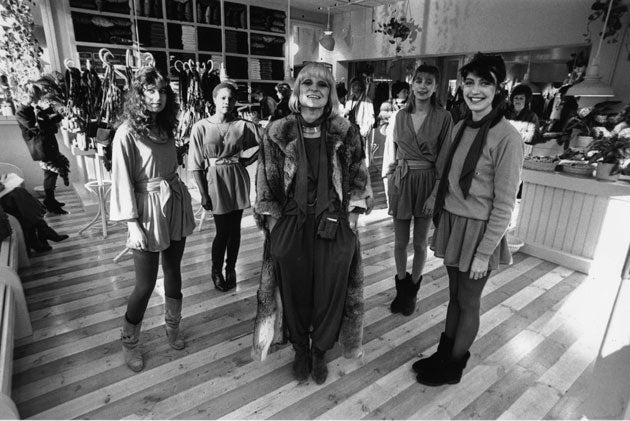Back to Biba: New film explores the fashion label that helped define a decade

It was the fashion hub of the swinging Sixties, as synonymous with those years as the Beatles, miniskirts and the Kings Road. Biba was credited with bringing fashion to the British high street until it vanished almost without trace.
The reason for its disappearance is explored in Beyond Biba: A Portrait of Barbara Hulanicki, which premieres this week. The documentary is the first in a slew of films offering behind-the-scenes access to the world of the fashion industry.
"Everyone had heard of Biba," said Tom Walters, a producer on Beyond Biba. "It was a real part of swinging Sixties London, but Barbara was reclusive, and most people in the UK don't know what happened to her after Biba closed."
The ups and downs of Ms Hulanicki's life are captured in the film, which shows the designer weeping when talking about the failure of Biba. The label shut its doors in 1975 after financial difficulties and relaunched in 2006 with the designer Bella Freud at the helm rather than the label's founder.
Undaunted, Ms Hulanicki has recently enjoyed success on the British high street for the second time, producing a sell-out line for Topshop. However, she is keen to differentiate between her collection and that of fellow Topshop designer Kate Moss. "She just gathers up armfuls of vintage clothes and takes inspiration," said Ms Hulanicki. "I suppose she is more styling than designing."
The film is not all beautiful people and wild parties, but relates harrowing incidents from the Polish-born designer's past, including the murder of her diplomat father, who was killed by the Zionist extremist organisation, the Stern Gang, in 1948.
The film, which will be screened for the first time at the Victoria and Albert Museum on Friday, is the first of several films aimed at fashion fans this summer, with fashion legends Coco Chanel and Vogue editor Anna Wintour both getting the Hollywood treatment.
The much-anticipated Coco avant Chanel, which stars the French actress Audrey Tatou as the designer, and explores her modest childhood and younger years, will hit UK screens on 31 July. Hot on its heels is The September Issue, a fly-on-the-wall documentary following Wintour as she creates the September issue of Vogue. The film is released in September.
"There is an innate glamour in the pairing of fashion and film, they are natural bedfellows," said Ali Jaafar, international editor of Variety magazine. "And with people like Barbara Hulanicki and Chanel, you generally get a rags-to-riches tale, which is a natural narrative."
Join our commenting forum
Join thought-provoking conversations, follow other Independent readers and see their replies
Comments
Bookmark popover
Removed from bookmarks